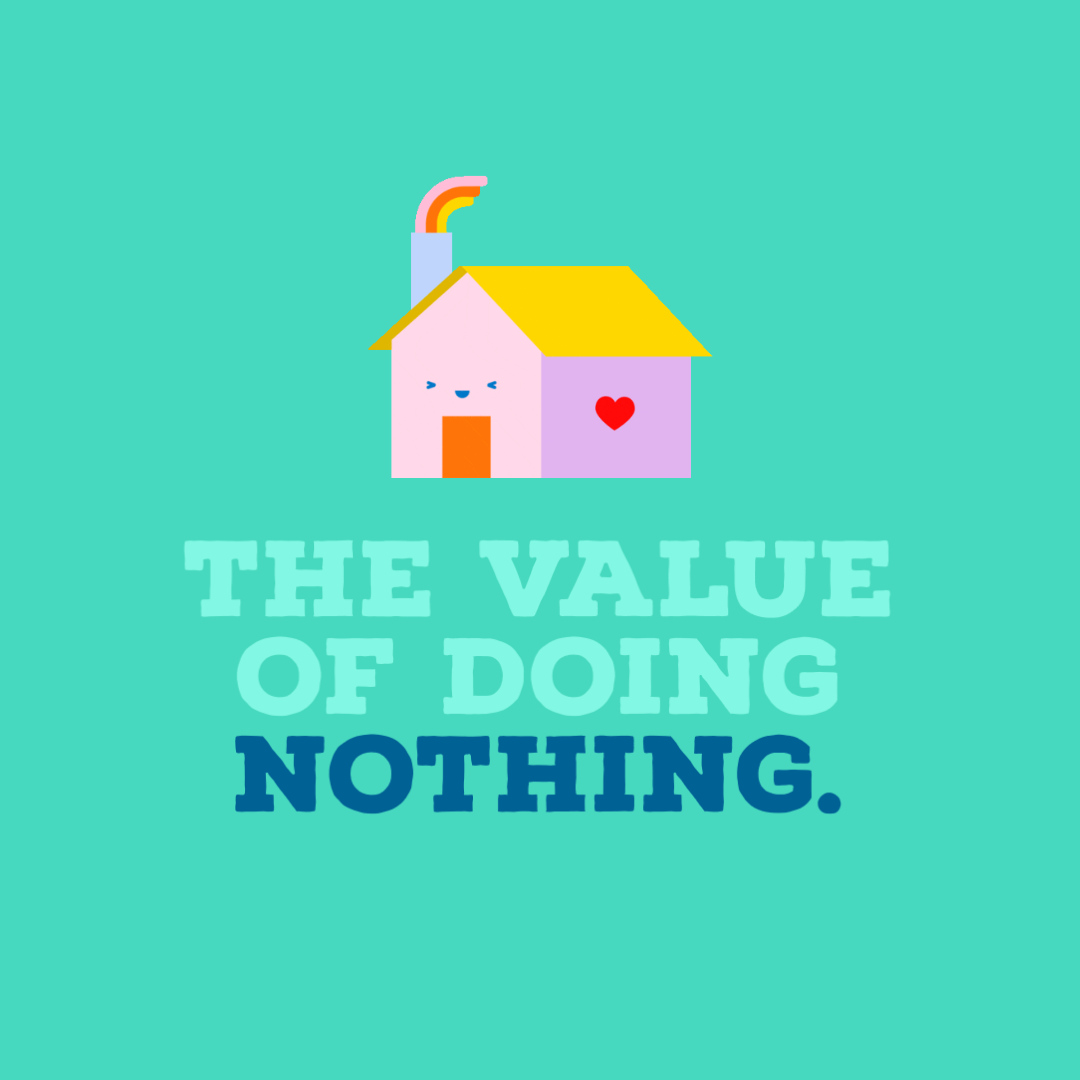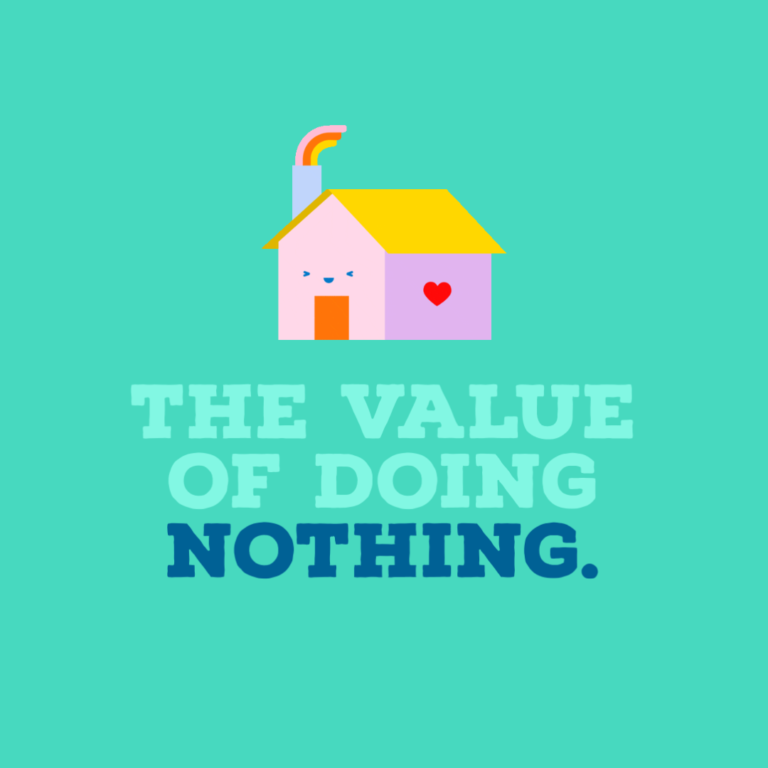Productivity is overwhelming

Productivity is Overwhelming: Doing Nothing is a whole lot of Something

Now that we are physically distancing and staying at home, it could be an opportunity to be productive. Finally, that project I started last year and ditched in the corner can be completed! Then you realize, you have no energy to focus on the only thing that really matters, surviving.
We wanted to remind you that there is value in “doing nothing”, we recognize that the most important act of staying at home is to take care of ourselves – that isn’t ‘nothing’, it’s a whole lot of something! That something is supporting our health care system and your community from the spread of COVID-19. It is also supporting your understanding of self and surviving through this experience of a global pandemic. Most of us have not experienced anything like this and it isn’t something we’ve learned from school, from members of our family or community. It’s all new.
We’ve checked in with ourselves and some folx and we hear that there is a pressure to be productive during this time. We are told we have time now, so we should be using it to better ourselves. But, that takes mental energy. If you are trying to figure out how you will survive, on top of taking care of your home, finances, basic needs, dependants or other responsibilities, well that is a lot more on your plate.
Here are a few sources we’ve found that have shared this sentiment of easing the need to be productive. They include links to the full articles. Below are a few quotes taken to help you see you are not alone in supporting your basic needs and not feel so guilty about ‘being productive’.
Must We All Become More Creative because of the Pandemic?
from Scientific American Blog
- The bizarre expectation that one needs to be hyperproductive when under the equivalent of house arrest has rightly triggered pushback. Nick Martin, writing in the New Republic, hits the nail on the head: Believing that each waking hour must be a productive one “is the natural endpoint of America’s hustle culture—the idea that every nanosecond of our lives must be commodified and pointed toward profit and self-improvement.”
- At the very least, it places grotesquely unrealistic expectations on those who are already grappling with far-from-normal working conditions. And secondly, it is just possible that Newton and Shakespeare were creative outliers, and that we mortals need not be ashamed of our lesser levels of achievement.
- Look after yourself, and those around you. You don’t have to learn a new language, master a musical instrument, write a screenplay or discover the Theory of Everything. Just getting through what lies ahead is enough.
Why You Should Ignore All That Coronavirus-Inspired Productivity Pressure
from The Chronicle of Higher Education
- Global catastrophes change the world, and this pandemic is very much akin to a major war. Even if we contain the Covid-19 crisis within a few months, the legacy of this pandemic will live with us for years, perhaps decades to come.
- And so, while it may feel good in the moment, it is foolish to dive into a frenzy of activity or obsess about your scholarly productivity right now. That is denial and delusion. The emotionally and spiritually sane response is to prepare to be forever changed.
- Stage No. 1: Security
- Consider it a good thing that you are not in denial, and that you are allowing yourself to work through the anxiety. No sane person feels good during a global disaster, so be grateful for the discomfort of your sanity. At this stage, I would focus on food, family, friends, and maybe fitness. (You will not become an Olympic athlete in the next two weeks, so don’t put ridiculous expectations on your body.)
- Know that you are not failing. Let go of all of the profoundly daft ideas you have about what you should be doing right now. Instead, focus intensely on your physical and psychological security. Your first priority during this early period should be securing your home.
- Devise a strategy for social connectedness with a small group of family, friends, and/or neighbors, while maintaining physical distancing
- Stage No. 2: The Mental Shift
- Once you have secured yourself and your team, you will feel more stable, your mind and body will adjust, and you will crave challenges that are more demanding. Given time, your brain can and will reset to new crisis conditions, and your ability to do higher-level work will resume…However, do not rush or prejudge your mental shift, especially if you have never experienced a disaster before.
- Now more than ever, we must abandon the performative and embrace the authentic. Our essential mental shifts require humility and patience. Focus on real internal change. These human transformations will be honest, raw, ugly, hopeful, frustrated, beautiful, and divine. And they will be slower than keener academics are used to. Be slow. Let this distract you. Let it change how you think and how you see the world. Because the world is our work. And so, may this tragedy tear down all our faulty assumptions and give us the courage of bold new ideas.
- Stage No. 3: Embrace a New Normal
- On the other side of this shift, your wonderful, creative, resilient brain will be waiting for you. When your foundations are strong, build a weekly schedule that prioritizes the security of your home team, and then carve out time blocks for different categories of your work: teaching, administration, and research. Do the easy tasks first and work your way into the heavy lifting. Wake up early. The online yoga and crossfit will be easier at this stage.
- Things will start to feel more natural. The work will also make more sense, and you will be more comfortable about changing or undoing what is already in motion. New ideas will emerge that would not have come to mind had you stayed in denial. Continue to embrace your mental shift. Have faith in the process. Support your team.
- Understand that this is a marathon. If you sprint at the beginning, you will vomit on your shoes by the end of the month… Right now, work toward establishing your serenity, productivity, and wellness under sustained disaster conditions.
- For most people, our minds have not come to terms with the fact that the world has already changed. Some faculty members are feeling distracted and guilty for not being able to write enough or teach online courses properly. Others are using their time at home to write and report a burst of research productivity. All of that is noise — denial and delusion. And right now, denial only serves to delay the essential process of acceptance, which will allow us to reimagine ourselves in this new reality.
- On the other side of this journey of acceptance are hope and resilience. We will know that we can do this, even if our struggles continue for years. We will be creative and responsive, and will find light in all the nooks and crannies.
COVID-19: It’s OK to Feel Overwhelmed and Be Unproductive
from Psychology Today
- I believe that, in addition to celebrating the gritty human drive to rise above our circumstances, we need to give each other permission to grieve. To be afraid. To sit with our emotions. To slow down. To slow way down, if we need to (and are able to).
- There’s nothing wrong with being productive or creative. It can be a helpful, constructive way to cope. But we must also allow ourselves space to not be “amazing.” Our world has not faced anything like this in over a century. It’s big. It’s ok, and even appropriate, to not be ok.
Stop Trying to Be Productive
from New York Times
- As the coronavirus outbreak has brought life largely indoors, many people are feeling pressure to organize every room in their homes, become expert home chefs (or bakers), write the next “King Lear” and get in shape. The internet — with its constant stream of how-to headlines and viral challenges — has only reinforced the demand to get things done.
- “It’s tough enough to be productive in the best of times let alone when we’re in a global crisis,” said Chris Bailey, a productivity consultant and the author of “Hyperfocus: How to Manage Your Attention in a World of Distraction.” “The idea that we have so much time available during the day now is fantastic, but these days it’s the opposite of a luxury.”
- “We’re home because we have to be home, and we have much less attention because we’re living through so much.”
Productivity Is Not Working
from Wired
- “Productivity” is not a synonym for health, or for safety, or for sanity. But as a precarious millennial who for the past 10 years has answered every cautious inquiry about my well-being with a rundown of how much work I got done that day, I do understand the confusion.
- It’s hardly surprising that so many of us are processing this immense, unknowable collective catastrophe by escaping into smaller, everyday emergencies. A crisis you create for yourself, after all, is a crisis you might be able to control. Frantic productivity is a fear response.
- But right now, we have a finite opportunity to rethink how we value ourselves, to re-examine our metric for measuring the worth of human lives. Right now, the entire species is trying to work out how to live in the same house without killing each other—and that may well turn out to be the work that matters most.
